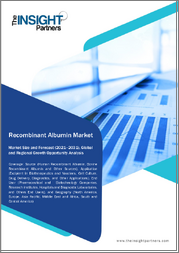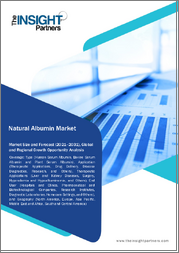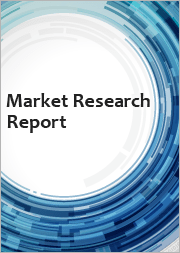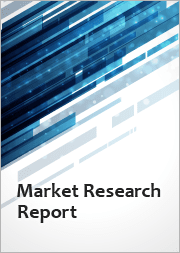
|
시장보고서
상품코드
1881741
알부민 부형제 시장 : 세계 산업 규모, 점유율, 동향, 기회, 예측 - 제품별, 최종사용자별, 지역별, 경쟁별(2020-2030년)Albumin Excipient Market - Global Industry Size, Share, Trends, Opportunity, and Forecast, Segmented By Product, By End user, By Region and Competition, 2020-2030F |
||||||
세계의 알부민 부형제 시장은 2024년에 49억 8,000만 달러로 평가되었으며, 2030년까지 CAGR 8.01%로 성장하여 79억 1,000만 달러에 달할 것으로 예측됩니다.
알부민 부형제는 고도로 정제된 단백질로, 일반적으로 인간 혈장 유래 또는 재조합 기술을 통해 제조되며, 의약품 제제에서 불활성 성분으로 활용됩니다. 주요 기능으로는 유효성분의 안정화, 용해도 향상, 제품 저장 기간 연장, 세포배양 배지, 백신 제조, 첨단 약물전달 시스템에서 중요한 요소로서의 역할이 있습니다. 시장 확대는 바이오의약품 및 생물학적 제제에 대한 세계 수요 증가, 정맥내 치료가 필요한 만성질환의 증가, 알부민 생산 및 정제 공정의 지속적인 기술 발전으로 인해 크게 촉진되고 있습니다.
| 시장 개요 | |
|---|---|
| 예측 기간 | 2026-2030년 |
| 시장 규모 : 2024년 | 49억 8,000만 달러 |
| 시장 규모 : 2030년 | 79억 1,000만 달러 |
| CAGR : 2025-2030년 | 8.01% |
| 가장 빠르게 성장하는 부문 | 인간 혈청 알부민 |
| 최대 시장 | 북미 |
주요 시장 촉진요인
세계 알부민 첨가제 시장은 안정화 및 전달 효율 향상을 위해 알부민에 크게 의존하는 바이오의약품 및 생물학적 제제에 대한 수요 증가로 인해 크게 촉진되고 있습니다. 제약 업계가 복잡한 단백질 기반 치료법에 집중함에 따라, 비면역원성 및 효과적인 안정제인 알부민의 특성은 필수 불가결한 요소로 자리 잡았습니다.
주요 시장 과제
세계 알부민 첨가제 시장의 과제는 혈장 유래 및 재조합 알부민 생산에 공통적으로 나타나는 높은 생산 비용입니다. 이 큰 장벽은 두 원료 공급원에 필요한 복잡하고 자원 집약적인 프로세스에 기인합니다.
주요 시장 동향
재조합 알부민 첨가제의 채택 확대는 공급과 안전성의 중요한 문제를 해결합니다. 혈장 유래 알부민과 달리 재조합 알부민 대체품은 균일성 향상, 바이러스 오염 위험 감소, 인간 혈장 조달에 따른 윤리적 및 공급망 문제를 극복할 수 있습니다.
자주 묻는 질문
목차
제1장 개요
제2장 조사 방법
제3장 주요 요약
제4장 고객의 소리
제5장 세계의 알부민 부형제 시장 전망
- 시장 규모 및 예측
- 금액별
- 시장 점유율과 예측
- 제품별(인간 혈청 알부민, 재조합 알부민)
- 최종사용자별(제약·바이오테크놀러지 산업, 연구기관, 기타)
- 지역별
- 기업별(2024)
- 시장 맵
제6장 북미의 알부민 부형제 시장 전망
- 시장 규모 및 예측
- 시장 점유율과 예측
- 북미 : 국가별 분석
- 미국
- 캐나다
- 멕시코
제7장 유럽의 알부민 부형제 시장 전망
- 시장 규모 및 예측
- 시장 점유율과 예측
- 유럽 : 국가별 분석
- 독일
- 프랑스
- 영국
- 이탈리아
- 스페인
제8장 아시아태평양의 알부민 부형제 시장 전망
- 시장 규모 및 예측
- 시장 점유율과 예측
- 아시아태평양 : 국가별 분석
- 중국
- 인도
- 일본
- 한국
- 호주
제9장 중동 및 아프리카의 알부민 부형제 시장 전망
- 시장 규모 및 예측
- 시장 점유율과 예측
- 중동 및 아프리카 : 국가별 분석
- 사우디아라비아
- 아랍에미리트
- 남아프리카공화국
제10장 남미의 알부민 부형제 시장 전망
- 시장 규모 및 예측
- 시장 점유율과 예측
- 남미 : 국가별 분석
- 브라질
- 콜롬비아
- 아르헨티나
제11장 시장 역학
- 성장 촉진요인
- 과제
제12장 시장 동향과 발전
- 인수합병
- 제품 출시
- 최근 동향
제13장 세계의 알부민 부형제 시장 : SWOT 분석
제14장 Porter's Five Forces 분석
- 업계내 경쟁
- 신규 참여의 가능성
- 공급업체의 능력
- 고객의 능력
- 대체품의 위협
제15장 경쟁 구도
- Albumin Therapeutics LLC
- Biotest AG
- CSL Limited
- HiMedia Laboratories
- Medxbio Pte Ltd.
- Octapharma AG
- RayBiotech Inc
- SeraCare(LGC Clinical Diagnostics, Inc.)
- Sigma-Aldrich(Merck KGaA)
- LFB USA , Inc.
제16장 전략적 제안
제17장 조사 회사 소개 및 면책사항
KSM 25.12.16The Global Albumin Excipient Market, valued at USD 4.98 Billion in 2024, is projected to experience a CAGR of 8.01% to reach USD 7.91 Billion by 2030. Albumin excipient is a highly purified protein, typically derived from human plasma or engineered recombinantly, utilized in pharmaceutical formulations as an inactive ingredient. Its primary functions include stabilizing active drug components, enhancing solubility, prolonging product shelf-life, and serving as a crucial element in cell culture media, vaccine production, and advanced drug delivery systems. The market's expansion is significantly driven by the escalating global demand for biopharmaceuticals and biologics, an increasing incidence of chronic diseases necessitating intravenous therapies, and continuous technological advancements in albumin production and purification processes.
| Market Overview | |
|---|---|
| Forecast Period | 2026-2030 |
| Market Size 2024 | USD 4.98 Billion |
| Market Size 2030 | USD 7.91 Billion |
| CAGR 2025-2030 | 8.01% |
| Fastest Growing Segment | Human Serum Albumin |
| Largest Market | North America |
Key Market Drivers
The global albumin excipient market is significantly propelled by the increasing demand for biopharmaceuticals and biologics, which rely heavily on albumin for stabilization and enhanced delivery. As the pharmaceutical industry increasingly focuses on complex protein-based therapies, albumin's unique properties as a non-immunogenic and effective stabilizer become indispensable. For example, according to the FDA's Center for Drug Evaluation and Research (CDER), in 2024, biologics accounted for 32% of all new drug approvals, a notable increase from the 28% average over the prior six years. This expanding pipeline and approval rate directly translate into a greater need for high-quality albumin excipients to ensure the safety, efficacy, and shelf-life of these advanced therapeutic products.
Key Market Challenges
The challenging factor for the Global Albumin Excipient Market is the inherently high production costs associated with both plasma-derived and recombinant albumin manufacturing. This significant impediment stems from the complex and resource-intensive processes required for both sources. For plasma-derived albumin, extensive collection networks, rigorous purification, and stringent safety testing contribute substantially to expenses. Similarly, recombinant albumin manufacturing necessitates sophisticated biotechnological processes, specialized equipment, and considerable research and development investments. These factors collectively drive up the cost of the final excipient.
Key Market Trends
The increasing adoption of recombinant albumin excipients addresses critical supply and safety considerations. Unlike plasma-derived albumin, recombinant alternatives offer enhanced consistency, a reduced risk of viral contamination, and overcome the ethical and supply chain challenges associated with human plasma sourcing. This shift is becoming increasingly necessary; according to the International Plasma and Fractionation Association (IPFA) and European Blood Alliance (EBA) symposium proceedings in August 2025, the European Medicines Agency anticipated plasma shortages to affect 14 European countries in 2024, highlighting the persistent supply challenges for plasma-derived products.
Key Market Players
- Albumin Therapeutics LLC
- Biotest AG
- CSL Limited
- HiMedia Laboratories
- Medxbio Pte Ltd.
- Octapharma AG
- RayBiotech Inc
- SeraCare (LGC Clinical Diagnostics, Inc.)
- Sigma-Aldrich (Merck KGaA)
- LFB USA , Inc.
Report Scope:
In this report, the Global Albumin Excipient Market has been segmented into the following categories, in addition to the industry trends which have also been detailed below:
Albumin Excipient Market, By Product:
- Human Serum Albumin
- Recombinant Albumin
Albumin Excipient Market, By End user:
- Pharmaceutical and Biotechnology Industry
- Research Institutes
- Others
Albumin Excipient Market, By Region:
- North America
- United States
- Canada
- Mexico
- Europe
- France
- United Kingdom
- Italy
- Germany
- Spain
- Asia Pacific
- China
- India
- Japan
- Australia
- South Korea
- South America
- Brazil
- Argentina
- Colombia
- Middle East & Africa
- South Africa
- Saudi Arabia
- UAE
Competitive Landscape
Company Profiles: Detailed analysis of the major companies presents in the Global Albumin Excipient Market.
Available Customizations:
Global Albumin Excipient Market report with the given market data, TechSci Research offers customizations according to a company's specific needs. The following customization options are available for the report:
Company Information
- Detailed analysis and profiling of additional market players (up to five).
Table of Contents
1. Product Overview
- 1.1. Market Definition
- 1.2. Scope of the Market
- 1.2.1. Markets Covered
- 1.2.2. Years Considered for Study
- 1.2.3. Key Market Segmentations
2. Research Methodology
- 2.1. Objective of the Study
- 2.2. Baseline Methodology
- 2.3. Key Industry Partners
- 2.4. Major Association and Secondary Sources
- 2.5. Forecasting Methodology
- 2.6. Data Triangulation & Validation
- 2.7. Assumptions and Limitations
3. Executive Summary
- 3.1. Overview of the Market
- 3.2. Overview of Key Market Segmentations
- 3.3. Overview of Key Market Players
- 3.4. Overview of Key Regions/Countries
- 3.5. Overview of Market Drivers, Challenges, Trends
4. Voice of Customer
5. Global Albumin Excipient Market Outlook
- 5.1. Market Size & Forecast
- 5.1.1. By Value
- 5.2. Market Share & Forecast
- 5.2.1. By Product (Human Serum Albumin, Recombinant Albumin)
- 5.2.2. By End user (Pharmaceutical and Biotechnology Industry, Research Institutes, Others)
- 5.2.3. By Region
- 5.2.4. By Company (2024)
- 5.3. Market Map
6. North America Albumin Excipient Market Outlook
- 6.1. Market Size & Forecast
- 6.1.1. By Value
- 6.2. Market Share & Forecast
- 6.2.1. By Product
- 6.2.2. By End user
- 6.2.3. By Country
- 6.3. North America: Country Analysis
- 6.3.1. United States Albumin Excipient Market Outlook
- 6.3.1.1. Market Size & Forecast
- 6.3.1.1.1. By Value
- 6.3.1.2. Market Share & Forecast
- 6.3.1.2.1. By Product
- 6.3.1.2.2. By End user
- 6.3.1.1. Market Size & Forecast
- 6.3.2. Canada Albumin Excipient Market Outlook
- 6.3.2.1. Market Size & Forecast
- 6.3.2.1.1. By Value
- 6.3.2.2. Market Share & Forecast
- 6.3.2.2.1. By Product
- 6.3.2.2.2. By End user
- 6.3.2.1. Market Size & Forecast
- 6.3.3. Mexico Albumin Excipient Market Outlook
- 6.3.3.1. Market Size & Forecast
- 6.3.3.1.1. By Value
- 6.3.3.2. Market Share & Forecast
- 6.3.3.2.1. By Product
- 6.3.3.2.2. By End user
- 6.3.3.1. Market Size & Forecast
- 6.3.1. United States Albumin Excipient Market Outlook
7. Europe Albumin Excipient Market Outlook
- 7.1. Market Size & Forecast
- 7.1.1. By Value
- 7.2. Market Share & Forecast
- 7.2.1. By Product
- 7.2.2. By End user
- 7.2.3. By Country
- 7.3. Europe: Country Analysis
- 7.3.1. Germany Albumin Excipient Market Outlook
- 7.3.1.1. Market Size & Forecast
- 7.3.1.1.1. By Value
- 7.3.1.2. Market Share & Forecast
- 7.3.1.2.1. By Product
- 7.3.1.2.2. By End user
- 7.3.1.1. Market Size & Forecast
- 7.3.2. France Albumin Excipient Market Outlook
- 7.3.2.1. Market Size & Forecast
- 7.3.2.1.1. By Value
- 7.3.2.2. Market Share & Forecast
- 7.3.2.2.1. By Product
- 7.3.2.2.2. By End user
- 7.3.2.1. Market Size & Forecast
- 7.3.3. United Kingdom Albumin Excipient Market Outlook
- 7.3.3.1. Market Size & Forecast
- 7.3.3.1.1. By Value
- 7.3.3.2. Market Share & Forecast
- 7.3.3.2.1. By Product
- 7.3.3.2.2. By End user
- 7.3.3.1. Market Size & Forecast
- 7.3.4. Italy Albumin Excipient Market Outlook
- 7.3.4.1. Market Size & Forecast
- 7.3.4.1.1. By Value
- 7.3.4.2. Market Share & Forecast
- 7.3.4.2.1. By Product
- 7.3.4.2.2. By End user
- 7.3.4.1. Market Size & Forecast
- 7.3.5. Spain Albumin Excipient Market Outlook
- 7.3.5.1. Market Size & Forecast
- 7.3.5.1.1. By Value
- 7.3.5.2. Market Share & Forecast
- 7.3.5.2.1. By Product
- 7.3.5.2.2. By End user
- 7.3.5.1. Market Size & Forecast
- 7.3.1. Germany Albumin Excipient Market Outlook
8. Asia Pacific Albumin Excipient Market Outlook
- 8.1. Market Size & Forecast
- 8.1.1. By Value
- 8.2. Market Share & Forecast
- 8.2.1. By Product
- 8.2.2. By End user
- 8.2.3. By Country
- 8.3. Asia Pacific: Country Analysis
- 8.3.1. China Albumin Excipient Market Outlook
- 8.3.1.1. Market Size & Forecast
- 8.3.1.1.1. By Value
- 8.3.1.2. Market Share & Forecast
- 8.3.1.2.1. By Product
- 8.3.1.2.2. By End user
- 8.3.1.1. Market Size & Forecast
- 8.3.2. India Albumin Excipient Market Outlook
- 8.3.2.1. Market Size & Forecast
- 8.3.2.1.1. By Value
- 8.3.2.2. Market Share & Forecast
- 8.3.2.2.1. By Product
- 8.3.2.2.2. By End user
- 8.3.2.1. Market Size & Forecast
- 8.3.3. Japan Albumin Excipient Market Outlook
- 8.3.3.1. Market Size & Forecast
- 8.3.3.1.1. By Value
- 8.3.3.2. Market Share & Forecast
- 8.3.3.2.1. By Product
- 8.3.3.2.2. By End user
- 8.3.3.1. Market Size & Forecast
- 8.3.4. South Korea Albumin Excipient Market Outlook
- 8.3.4.1. Market Size & Forecast
- 8.3.4.1.1. By Value
- 8.3.4.2. Market Share & Forecast
- 8.3.4.2.1. By Product
- 8.3.4.2.2. By End user
- 8.3.4.1. Market Size & Forecast
- 8.3.5. Australia Albumin Excipient Market Outlook
- 8.3.5.1. Market Size & Forecast
- 8.3.5.1.1. By Value
- 8.3.5.2. Market Share & Forecast
- 8.3.5.2.1. By Product
- 8.3.5.2.2. By End user
- 8.3.5.1. Market Size & Forecast
- 8.3.1. China Albumin Excipient Market Outlook
9. Middle East & Africa Albumin Excipient Market Outlook
- 9.1. Market Size & Forecast
- 9.1.1. By Value
- 9.2. Market Share & Forecast
- 9.2.1. By Product
- 9.2.2. By End user
- 9.2.3. By Country
- 9.3. Middle East & Africa: Country Analysis
- 9.3.1. Saudi Arabia Albumin Excipient Market Outlook
- 9.3.1.1. Market Size & Forecast
- 9.3.1.1.1. By Value
- 9.3.1.2. Market Share & Forecast
- 9.3.1.2.1. By Product
- 9.3.1.2.2. By End user
- 9.3.1.1. Market Size & Forecast
- 9.3.2. UAE Albumin Excipient Market Outlook
- 9.3.2.1. Market Size & Forecast
- 9.3.2.1.1. By Value
- 9.3.2.2. Market Share & Forecast
- 9.3.2.2.1. By Product
- 9.3.2.2.2. By End user
- 9.3.2.1. Market Size & Forecast
- 9.3.3. South Africa Albumin Excipient Market Outlook
- 9.3.3.1. Market Size & Forecast
- 9.3.3.1.1. By Value
- 9.3.3.2. Market Share & Forecast
- 9.3.3.2.1. By Product
- 9.3.3.2.2. By End user
- 9.3.3.1. Market Size & Forecast
- 9.3.1. Saudi Arabia Albumin Excipient Market Outlook
10. South America Albumin Excipient Market Outlook
- 10.1. Market Size & Forecast
- 10.1.1. By Value
- 10.2. Market Share & Forecast
- 10.2.1. By Product
- 10.2.2. By End user
- 10.2.3. By Country
- 10.3. South America: Country Analysis
- 10.3.1. Brazil Albumin Excipient Market Outlook
- 10.3.1.1. Market Size & Forecast
- 10.3.1.1.1. By Value
- 10.3.1.2. Market Share & Forecast
- 10.3.1.2.1. By Product
- 10.3.1.2.2. By End user
- 10.3.1.1. Market Size & Forecast
- 10.3.2. Colombia Albumin Excipient Market Outlook
- 10.3.2.1. Market Size & Forecast
- 10.3.2.1.1. By Value
- 10.3.2.2. Market Share & Forecast
- 10.3.2.2.1. By Product
- 10.3.2.2.2. By End user
- 10.3.2.1. Market Size & Forecast
- 10.3.3. Argentina Albumin Excipient Market Outlook
- 10.3.3.1. Market Size & Forecast
- 10.3.3.1.1. By Value
- 10.3.3.2. Market Share & Forecast
- 10.3.3.2.1. By Product
- 10.3.3.2.2. By End user
- 10.3.3.1. Market Size & Forecast
- 10.3.1. Brazil Albumin Excipient Market Outlook
11. Market Dynamics
- 11.1. Drivers
- 11.2. Challenges
12. Market Trends & Developments
- 12.1. Merger & Acquisition (If Any)
- 12.2. Product Launches (If Any)
- 12.3. Recent Developments
13. Global Albumin Excipient Market: SWOT Analysis
14. Porter's Five Forces Analysis
- 14.1. Competition in the Industry
- 14.2. Potential of New Entrants
- 14.3. Power of Suppliers
- 14.4. Power of Customers
- 14.5. Threat of Substitute Products
15. Competitive Landscape
- 15.1. Albumin Therapeutics LLC
- 15.1.1. Business Overview
- 15.1.2. Products & Services
- 15.1.3. Recent Developments
- 15.1.4. Key Personnel
- 15.1.5. SWOT Analysis
- 15.2. Biotest AG
- 15.3. CSL Limited
- 15.4. HiMedia Laboratories
- 15.5. Medxbio Pte Ltd.
- 15.6. Octapharma AG
- 15.7. RayBiotech Inc
- 15.8. SeraCare (LGC Clinical Diagnostics, Inc.)
- 15.9. Sigma-Aldrich (Merck KGaA)
- 15.10. LFB USA , Inc.
16. Strategic Recommendations
17. About Us & Disclaimer
(주말 및 공휴일 제외)









